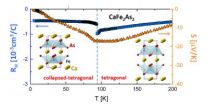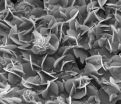(Press-News.org) OAK RIDGE, Tenn., May 5, 2014 – For the first time, scientists have a clearer understanding of how to control the appearance of a superconducting phase in a material, adding crucial fundamental knowledge and perhaps setting the stage for advances in the field of superconductivity.
The paper, published in Physical Review Letters, focuses on a calcium-iron-arsenide single crystal, which has structural, thermodynamic and transport properties that can be varied through carefully controlled synthesis, similar to the application of pressure. To make this discovery, researchers focused on how these changes alter the material's Fermi surface, which maps the specific population and arrangement of electrons in materials.
"The Fermi surface is basically the 'genetic code' for causing a certain property, including superconductivity, in a material," said Athena Safa-Sefat of the Department of Energy's Oak Ridge National Laboratory, which led the research team. "We can make different phases of this material in single crystal forms and measure their structure and properties, but now we have Fermi surface signatures that explain why we can't induce superconductivity in a certain structural phase of this material."
Superconducting wires conduct electricity without resistance and could save the nation billions of dollars per year by virtually eliminating transmission losses on the grid, or they can be used to make compact, light and powerful motors and generators. This particular material is of special interest because it adds critical knowledge to the field of superconductivity that will ultimately allow such widespread applications.
The lead author of this paper, Krzysztof Gofryk, who did this work as a post-doctoral fellow at ORNL, showed how the interplay of structure and magnetism affected the Fermi surface and hence the electronic properties.
In calcium-iron-arsenide, the bulk superconducting state is absent because of the large Fermi surface modification at the structural transition.
This work represents a significant step forward for understanding this material's rich phase diagram and causes of superconductivity, Sefat said.
INFORMATION:
Other authors of the paper, titled "Fermi-Surface Reconstruction and Complex Phase Equilibria in CaFe2As2," are ORNL's post-doctoral fellow Bayrammurad Saparov and scientists from Los Alamos National Laboratory and Dresden University of Technology. The paper is available at http://arxiv.org/abs/1404.1095.
This research was funded by DOE's Office of Science and by LANL's Laboratory Directed Research and Development program.
UT-Battelle manages ORNL for the Department of Energy's Office of Science. DOE's Office of Science is the single largest supporter of basic research in the physical sciences in the United States, and is working to address some of the most pressing challenges of the time. For more information, please visit science.energy.gov.
Image: http://www.ornl.gov/Image%20Library/Main%20Nav/ORNL/News/News%20Releases/2014/FERMI-Figure-HighRes.jpg?code=185a0a2b-f26e-4359-b319-99a8db94901a
Cutline: A change of Hall and Seebeck effects point to large Fermi surface modification at the structural transition, preventing superconductivity at low temperatures. The change in the Fermi surface topology has been confirmed by angle-resolved photoemission spectroscopy.
NOTE TO EDITORS: You may read other press releases from Oak Ridge National Laboratory or learn more about the lab at http://www.ornl.gov/news. Additional information about ORNL is available at the sites below:
Twitter - http://twitter.com/oakridgelabnews
RSS Feeds - http://www.ornl.gov/ornlhome/rss_feeds.shtml
Flickr - http://www.flickr.com/photos/oakridgelab
YouTube - http://www.youtube.com/user/OakRidgeNationalLab
LinkedIn - http://www.linkedin.com/companies/oak-ridge-national-laboratory
Facebook - http://www.facebook.com/Oak.Ridge.National.Laboratory
ORNL paper examines clues for superconductivity in an iron-based material
2014-05-05
ELSE PRESS RELEASES FROM THIS DATE:
New cause of high blood pressure and heart disease discovered
2014-05-05
Phosphate rich foods include processed cheese, Parmesan, cola, baking powder and most processed foods. Phosphates are widely used in the food industry as preservatives and pH stabilizers. When large quantities of phosphates are consumed, production of the FGF23 hormone is stimulated, which has a negative effect on the cardiovascular system. Reinhold Erben, the head of the Unit of Physiology, Pathophysiology and Biophysics at the Vetmeduni Vienna, warns that "our phosphate consumption is relevant for our state of health."
Over 500 million people around the world suffer ...
No credible evidence to support cardiac risk of testosterone therapy
2014-05-05
New Rochelle, NY, May 5, 2014—Recent articles in the scientific literature and mass media that question the use of testosterone (T) therapy to treat T deficiency, or "low T," and assert the cardiovascular risks of T therapy, are flawed, according to a provocative Guest Editorial in Journal of Men's Health, a peer-reviewed publication from Mary Ann Liebert, Inc., publishers. The article is available free on the Journal of Men's Health website at http://www.liebertpub.com/jmh.
In "Testosterone Therapy and Cardiovascular Risk: A Cautionary Tale" Martin Miner, MD, The Warren ...
When wine hits the right nerve
2014-05-05
If wine leaves a bitter, cotton-like coating on the tongue, neither the sense of taste nor the sense of smell is responsible. The traditional oak barrel character, also called barrique character, is perceived via the trigeminal nerve, which is responsible for, among other things, pain and temperature perception. This is reported in the journal "Chemical Senses" by a research team headed by Prof Dr Dr Dr Hanns Hatt from the Faculty of Biology and Biotechnology at the Ruhr-Universität.
Patients with severed taste nerve do still taste barrique flavour
In collaboration ...
Caring for horses eases symptoms of dementia
2014-05-05
COLUMBUS, Ohio—In the first study of its kind, researchers have determined that spending time with horses eases symptoms of Alzheimer's dementia.
A collaboration between The Ohio State University, an equine therapy center and an adult daycare center found that people with Alzheimer's were able to safely groom, feed and walk horses under supervision—and the experience buoyed their mood and made them less likely to resist care or become upset later in the day.
The small pilot study, which appears in the journal Anthrozoös, suggests that equine therapy—a treatment used ...
Dementia diagnosis twice as likely if older adult has schizophrenia; cancer less likely
2014-05-05
INDIANAPOLIS -- Researchers from Regenstrief Institute and Indiana University who followed over 30,000 older adults for a decade have found the rate of dementia diagnosis for patients with schizophrenia to be twice as high as for patients without this chronic, severe and disabling brain disorder.
"Individuals with serious mental illnesses including schizophrenia appear to be living longer than earlier estimates suggested," said Hugh Hendrie, M.B., Ch.B., D.Sc., the geriatric psychiatrist who led the study. Dr. Hendrie is a Regenstrief Institute investigator, IU Center ...
Molecular tumor board helps in advanced cancer cases
2014-05-05
With accelerating development of personalized cancer treatments matched to a patient's DNA sequencing, proponents say frontline physicians increasingly need help to maneuver through the complex genomic landscape to find the most effective, individualized therapy.
In a paper published in the May 5 online issue of The Oncologist, researchers at the University of California, San Diego School of Medicine and Moores Cancer Center detail their experience evaluating 34 patients between December 2012 and June 2013 using a molecular tumor board – a new type of advisory group comprised ...
Researchers present findings on promising biomarker for esophageal cancer
2014-05-05
CLEVELAND – A new biomarker for esophageal cancer shows promise in improving screening for this deadly disease and its precursor, Barrett's esophagus.
Amitabh Chak, MD, of University Hospitals Case Medical Center's Seidman Cancer Center and Case Western Reserve University School of Medicine, presented findings today at Digestive Disease Week in Chicago in a research forum titled "Aberrant Vimentin Methylation in Esophageal Brushings: A Biomarker for Detecting Barrett's Esophagus and Esophageal Adenocarcinoma" (embargoed May 5, 9:15 am CT).
Dr. Chak and a research team ...
Study: Game developers say success hinges on more than just programming skills
2014-05-05
Aspiring game developers may want to bone up on their interpersonal skills. A forthcoming study from North Carolina State University and Microsoft Research finds that game developers need a suite of non-programming skills – including communication skills – that are considered less important in other fields of software development.
"We wanted to evaluate which skills are important to game developers versus other fields of software development," says Dr. Emerson Murphy-Hill, an assistant professor of computer science at NC State and lead author of a paper on the work. "These ...
High-strength materials from the pressure cooker
2014-05-05
This news release is available in German. The earth's crust works like a pressure cooker. Minerals typically do not form under standard conditions, but at high temperatures and pressures. However, an environment of extreme heat and pressure has been considered to be absolutely unsuitable for organic molecules. Scientists at Vienna University of Technology found out that under such seemingly hostile conditions, organic materials with remarkable material properties can be synthesized – for instance Kevlar, an extremely versatile high-performance material. The new technique ...
How does stress increase your risk for stroke and heart attack?
2014-05-05
Philadelphia, PA, May 5, 2014 – Scientists have shown that anger, anxiety, and depression not only affect the functioning of the heart, but also increase the risk for heart disease.
Stroke and heart attacks are the end products of progressive damage to blood vessels supplying the heart and brain, a process called atherosclerosis. Atherosclerosis progresses when there are high levels of chemicals in the body called pro-inflammatory cytokines.
It is thought that persisting stress increases the risk for atherosclerosis and cardiovascular disease by evoking negative emotions ...




